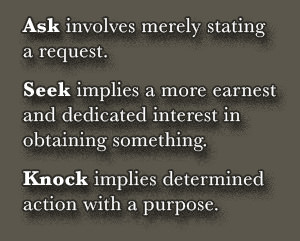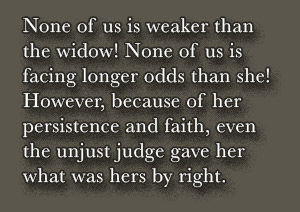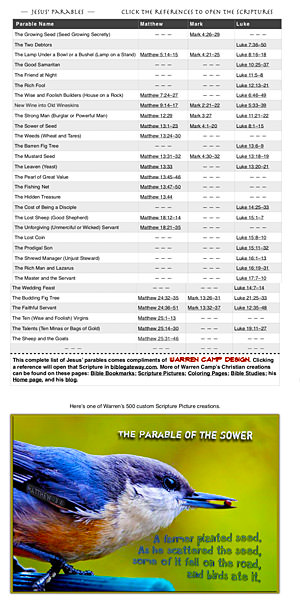
Two Parables
The Friend at Midnight and the Persistent Widow
The first parable is the story of the neighbor who was in need of bread for a visitor (Luke 11:5–13). The disciples had just asked Jesus to teach them to pray (v. 1), and the lesson that he was teaching them through this parable was to be persistent in prayer.

† Find Warren’s short summary at the bottom of page.

In the second parable on not giving up (Luke 18:1–8), a judge lacking compassion is repeatedly approached by a poor widow, seeking justice. Initially rejecting her demands, he eventually honors her request so that he won’t be worn out by her persistence.


Click the list or the “bird” to enlarge and use Warren’s list of forty-four of Jesus’ parables (a PDF file with links to Scriptures).
Start Reading Warren’s Commentary . . .
Find his summary at the bottom.
par•a•ble [noun] a simple story used to illustrate the meaning of or a moral or spiritual lesson, as told by Jesus in the gospels
synonyms: allegory, moral story/tale, fable
Jesus’ Two Parables about “Not Giving Up”
— The Friend at Midnight — Luke 11:5–13
— The Persistent Widow — Luke 18:1–8
The first parable, sometimes called the Parable of the Midnight Friend, is about a man who had a friend come to him late at night after a journey. The second parable, the Persistent Widow Parable, is the story of an unjust judge and a persistent widow who has all the odds stacked against her. Both parables show us the importance of persisting in prayer.
As far as prayer’s essential characteristics, the first parable stresses the need to be passionate when praying while emphasizing God’s desire to answer prayers. In the second parable, we’re urged to be persistent in prayer, not giving up and losing hope; instead, we’re to be faithful as we pray. When we pray without ceasing and have confidence in God, the benefits are many: We experience the goodness of God as we commune with him; we become eager participants in his purposes, yielding our lives and wills to him; and we enter his presence with boldness and security, knowing that he’ll bless us with his fellowship and love.
Here’s an animated video of Jesus’ “Parable of the Friend at Midnight.”
This two-minute animation is a delightful presentation of our first parable.
Passion and Persistence
The Parable of the Friend at Midnight . . . Inspiration to Pray
Luke 11:5–13
5Then Jesus said to them, “Suppose you have a friend, and you go to him at midnight and say, ‘Friend, lend me three loaves of bread; 6a friend of mine on a journey has come to me, and I have no food to offer him.’ 7And suppose the one inside answers, ‘Don’t bother me. The door is already locked, and my children and I are in bed. I can’t get up and give you anything.’ 8I tell you, even though he will not get up and give you the bread because of friendship, yet because of your shameless audacity he will surely get up and give you as much as you need.
9“So I say to you: Ask and it will be given to you; seek and you will find; knock and the door will be opened to you. 10For everyone who asks receives; the one who seeks finds; and to the one who knocks, the door will be opened.
11“Which of you fathers, if your son asks for a fish, will give him a snake instead? 12Or if he asks for an egg, will give him a scorpion? 13If you then, though you are evil, know how to give good gifts to your children, how much more will your Father in heaven give the Holy Spirit to those who ask him!”
Luke 11 begins with Jesus choosing “what is better” by spending time with his Father in prayer. Apparently his disciples were watching him as he prayed. One of them (not named) was so moved by what he saw that he felt compelled to ask Jesus for further insight on prayer. No doubt Jesus was pleased to hear of such interest; not everyone who approached him did so with spiritual issues in mind.
The Passion of the Person Praying
Persistence in prayer is often suggested as the lesson to be gleaned from both of today’s parables. For the first, passion is an appropriate word as well, possibly describing more accurately the degree of involvement of the person praying. A sense of heightened passion is conveyed by the three words used by Jesus in v. 9: ask, seek, and knock. Ask involves merely stating a request. Seek implies a more intense interest in obtaining something. Knock implies action with a purpose; the person has actually located a place where the desired object can be found.
Q. Why is God concerned about our level of passion when we pray?
A. He’s interested not just in our prayers, but in us as his “pray-ers.”
While the word ask is prominent in Jesus’ teaching, God wants us to become people who see prayer as more than a time to present requests. Prayer is also meant to be a time for self-examination so we can get to know ourselves and our Father more deeply (such as a personal relationship). This cannot be done if prayer becomes merely a time in which to present our “shopping list” to God.
The Provision of a Loving Father
Verses 11–13 call attention to the love and generosity of the One hearing our prayer. What father doesn’t relish the opportunity to grant the requests of his children? He may not be able to provide everything for which a child asks, but if he’s truly a loving father, he’ll never mislead or trick the child into thinking that he or she is receiving something good when in reality it’s something harmful.
In the same way, said Jesus, God is a gracious Father, willing to “give the Holy Spirit to those who ask him.” Jesus’ reference to the Spirit challenges us to view prayer, not as a method for us to get what we want, but as a means of submitting to what our Father wants for us. Again, the word “passion” is also a good word to describe God’s perspective on prayer, for he’s passionate about giving us all that he knows we need. The problem is that, too often, our passions conflict with his. Our vision is too small, focused primarily on what this world has to offer us when we should instead be thinking with a more eternally oriented mind-set.
But when our passions become more attuned to those of our heavenly Father — for us and for the world — then we’ll find ourselves becoming model “pray-ers” for others.
This entertaining video highlights the meaning of this second parable.
A 1.25-minute video, compliments of Strong Hands Enterprises.
The Parable of the Persistent Widow
Always Pray and Don’t Give Up — Luke 18:1–8
Then Jesus told his disciples a parable to show them that they should always pray and not give up (Luke 18:1).
In many translations, that first verse starts with “Then.” Notice that this teaching on prayer follows Jesus’ teaching on the coming of the Son of Man. Indeed, v. 8 of this second parable ends with that theme. So we should think of v. 1 as an exhortation to us, his disciples, who may be undergoing a struggle prior to the coming of the Son of Man, not to give up hope, but to pray, expecting a speedy answer.
Enter the unjust judge and the persistent widow. . .
He said: “In a certain town there was a judge who neither feared God nor cared about men. 3And there was a widow in that town who kept coming to him with the plea, ‘Grant me justice against my adversary’ (vv. 2–3).
Jesus has now introduced the characters in his story: first, the judge. The phrase “feared God” refers to faith in God (piety) and recognition that God will judge the sons of men (i.e., including that judge and all of us). The judge had no regard for God’s justice. He seems to have been concerned with himself: his own opinions, his own comfort, his own income.
Second character: the widow. Widows had a difficult place then, around the world. In Scripture language, widowhood is symbolic of defenselessness, and the early church concerned itself much about the welfare of widows (Acts 6:1; 9:41; James 1:27; 1 Timothy 5:5). Normally, the wife of a deceased husband had no legal right to inherit her husband’s estate, so when her husband died, she couldn’t take for granted her living in his house on his land. If her deceased husband had no children, the estate reverted to her husband’s male relatives on his father’s side — his brothers, his father’s brothers, and then the nearest family kinsman. We don’t know how the widow was being cheated, but her judge apparently was on the side of her adversary. She didn’t have money for lawyers; she was probably holding on by a hair. But there’s one thing we know about her: She was persistent, as we see in the term, “kept coming to him.”
The Value of Persistence
“For some time he refused. But finally he said to himself, ‘Even though I don’t fear God or care about men, 5yet because this widow keeps bothering me, I will see that she gets justice, so that she won’t eventually wear me out with her coming!’” (vv. 4–5).
This weak little widow, “the squeaky wheel,” was starting to make the powerful judge feel some heat. This widow’s constant appeals were hurting the judge’s reputation. Whatever he’d been paid wasn’t worth the hassle she was causing. He decided to grant her what she was due just to get rid of her.
The point of this soliloquy is this: Though the high motives, such as accountability among men, don’t lead the judge to provide requisite justice to this woman, yet he simply felt the need to put an end to her persistence.
This wasn’t a real widow, of course, nor a real judge. But Jesus’ hearers had met widows like her and had experience with judges like him. They’d met people like that, so this story was true-to-life for those who’d heard Jesus tell it.
God’s Sure and Quick Justice: Will He Find Faith on Earth?
And the Lord said, “Listen to what the unjust judge says. 7And will not God bring about justice for his chosen ones, who cry out to him day and night? Will he keep putting them off? 8I tell you, he will see that they get justice, and quickly. However, when the Son of Man comes, will he find faith on the earth?” (vv. 6–8).
Interestingly, this “And the Lord said,” expression indicates that the Lord paused for a moment, so that the parable might be fully grasped before he made his direct application. His answer was firm: “He will see that they get justice, and quickly.” The word “quickly” is Greek tachos, “speed, quickness, swiftness, haste.” Incidentally, for you roadway speed demons, the word “tachometer” (measuring speed of rotation) comes from this Greek word.
Jesus followed by asking, “And will not God bring about justice for his chosen ones, who cry out to him day and night?” The application is an argument that presents a triple antithesis: (1) in the petitioned — a just God and an unrighteous judge; (2) in the petitioners — a despised widow and the beloved elect; and (3) in the petition itself — the frequent visits of the one, and the continual cries of the many.
Jesus has told a parable of persistence of a widow — weak in the world’s estimation — who’d won a victory because she didn’t give up hope; she didn’t give up her plea; she finally won the day. This parable resembles that of the Parable of the Friend at Midnight (shown atop this page), but in it the petitioner asked for a gift, while in this one the request was for justice and deliverance. This parable also teaches us that, as saints, we must be prayerfully patient until the Lord’s return.
A Hearty Application to Make
But what about you and me? We sometimes become so worn down and discouraged by our lives that we stop praying, stop hoping, stop expecting God to intervene. We get tempted to give up. This makes Jesus rightly wonder . . . “When the Son of Man comes, will he find faith on the earth?”
Hearty soul: Jesus told this story to us, his disciples, so that we might be encouraged. None of us is weaker than the widow! None of us is facing longer odds than she! But because of her persistence and faith, even the unjust judge gave her what was hers by right.
Jesus knew that we’d at times feel fainthearted, which is why he told the Parable of the Persistent Widow. The Lord wanted to encourage his followers to be tireless in prayer. This requires faith, without which it’s impossible to please God (Hebrews 11:6).
So keep praying, and let the Word of God encourage you personally. You’ll hear his assurance as he fights for you.
Yes, we sometimes feel discouraged. But we must not quit; we must never give up praying personally and persistently to God. Amen!
Question 1 As for prayer, are you more likely to give up or hang tough? Why?
Question 2 Does this story mean you should keep praying to get rich or to see the coming of God’s kingdom? Why?
“For everyone who asks receives; he who seeks finds; and to him who knocks, the door will be opened” (Luke 11:10).

Take our “Parables Quiz.”
See Warren’s other “Parables of Jesus” commentaries.
— Warren’s Concise Summary —
In the Friend at Night Parable, Jesus describes a man who goes to his friend at midnight to ask for bread to feed an unexpected guest; though the friend initially refuses because it’s late and inconvenient, he eventually gets up and gives him what he needs because of his neighbor’s shameless persistence, illustrating how disciples should keep asking, seeking, and knocking in prayer, trusting their Father’s generous heart.
In the Persistent Widow, Jesus tells of a widow who repeatedly pleads with an unjust judge for justice against her adversary; although he doesn’t fear God or care about people, he finally grants her request simply to stop her continual bothering. Jesus uses this story to show that if even an unjust judge will respond to persistent appeals, then God will certainly bring about justice for his chosen ones who cry out to him day and night, encouraging steadfast, confident prayer rooted in God’s goodness.

